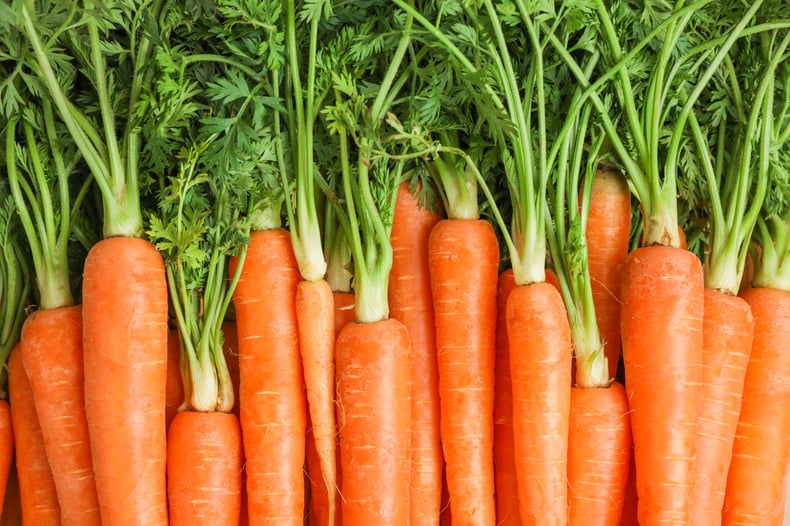Ideas for repurposing overproduced and leftover carrots

This post is part of a new series looking at ideas for repurposing commonly overproduced menu items.
We see carrots going to waste often across the wide range of foodservice operators we work with at Leanpath, whether it be raw unprepared carrot that was not used for its primary purpose or raw or cooked carrot that was overproduced and then wasted. In both of the above circumstances, there are many actions teams can take to prevent waste of carrots by either preserving or repurposing.
With a bit of foresight, whole surplus carrots that are not going to be used can easily be saved from spoiling by being preserved and stored for a later date, becoming a texture and flavor boosting accompaniment for many dishes.
Pickled Carrot: By following the same process as with pickled cornichon or cucumbers, carrots work excellently due to their robustness and crunch. Mix up the whole spices, vinegars and aromatics in your pickling liquor to create a range of unique and tasty pickles. Cumin, fennel and cilantro seeds all work really well with carrots!
Carrot Chutney: Cooking grated carrot down into a chutney brings out their sweetness while providing you with a tasty product with a long shelf life. Indian Carrot chutney or even a twist on a caramelized red onion chutney adds a flavor bomb to your pantry that can elevate burgers, sandwiches and other dishes on your menu!
With overproduced carrots that have been held to a safe temperature and environment, there are endless possibilities for repurposing:
Carrot Soup: Create a delicious and comforting carrot soup by blending cooked carrots with stock, herbs, and seasonings. You can customize the flavors by adding ingredients like ginger, garlic, or warm spices. As carrot has a sweet flavor, it pairs well with spices and more savory ingredients and dairy. Garnish with crunchy textures like dukkah, herbs or a dollop of sour cream or a plant-based alternative.
Carrot Puree: Make a versatile carrot puree that can be used as a side dish, a base for sauces, or an ingredient in other recipes. Simply blend cooked carrots with a touch of butter, cream, or vegetable broth until smooth. Blending carrots into a puree before storing will also take up less precious refrigeration space!
Vegetable Stock: Use carrot scraps, along with other vegetable trimmings, to make a flavorful homemade vegetable stock. This stock can be used as a base for soups, stews, and sauces.
Carrot Salad: Shred or thinly slice leftover raw carrots to create a colorful and nutritious carrot salad. Mix with other shredded vegetables, fruits, and a zesty dressing. Add nuts or seeds for crunch and herbs for flavor. For cooked carrots, roasting in a tasty marinade can elevate the flavor and texture before including in a more robust salad like a Tabbouleh, Fattoush or a Panzanella.
Carrot Muffins, Bread or Cake: Incorporate grated carrots into muffin, cake or bread batter for a delightful and healthy twist. Carrot muffins can be sweet or savory, depending on the recipe.
Stir-Fries and Fried Rice: Sauté chopped carrots in a stir-fry or add them to fried rice for extra texture and flavor. They provide a hint of sweetness and vibrant color to these dishes.
Carrot Fritters: Mix grated carrots with eggs, flour, and seasonings to create carrot fritters. Pan-fry until golden brown and serve as a delicious appetizer or side dish. How about a Greek inspired fritter with feta and mint, replacing the more traditionally used courgette with carrot!
Carrot Chips: Slice leftover raw carrots into thin rounds, toss them with a light drizzle of olive oil and seasonings, and bake in the oven until crispy. These make for a healthier alternative to potato chips and also work well as a textured garnish on a range of dishes.
Carrot Hummus: Blend cooked carrots with chickpeas, tahini, garlic, cumin and lemon juice to make a colorful and nutritious carrot hummus. Roasting your carrots first will elevate the final flavor of the hummus. Serve with pita bread or vegetable sticks. Cooked carrots can be used as a central ingredient for a wide range of dips across varying global cuisines from Boranis to Chutneys to Tzatzikis
Carrot Smoothies: Add cooked or raw carrots to smoothies for an extra boost of vitamins and a natural sweetness. Pair them with fruits like oranges, mangoes and pineapples or marry with health boosting super foods such as ginger or turmeric.
Remember that safety and quality standards are essential when repurposing leftovers. Ensure that leftover carrots are properly stored and handled according to food safety guidelines. If there is a smart system in place for putting less food out at a time and adjusting as service goes on, the amount of repurposable overproduction will increase and ultimately contribute to reducing the food waste in your operation.
Sign up for our monthly newsletter for the latest in
food waste prevention initiatives, best practices, webinars and more.
